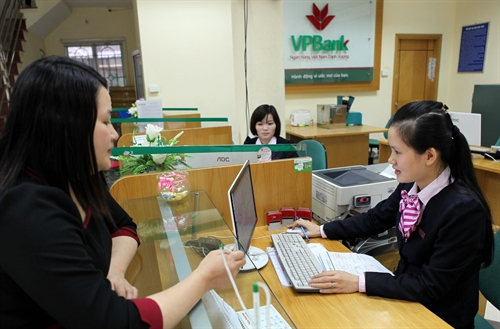 Economy
Economy

Banking experts shared their experiences in applying the Basel II capital adequacy guidelines at an IFC-hosted workshop yesterday in Hà Nội.
 |
| A client makes a transaction at the Việt Nam Prosperity Joint Stock Commercial Bank’s Thái Bình branch. IFC has approved a US$125-million finance package for the bank yesterday. — VNA/VNS Photo Trần Việt |
HÀ NỘI — Banking experts shared their experiences in applying the Basel II capital adequacy guidelines at an IFC-hosted workshop yesterday in Hà Nội.
Nguyễn Toàn Thắng, general secretary of the Việt Nam Banks’ Association (VNBA), said the workshop would enhance bankers’ understanding of the internal capital adequacy assessment process (ICAAP), a key component of central bank regulations worldwide. ICAAP is also central to Basel II, which are international banking guidelines that require financial institutions to have sufficient capital to support the risks incurred in banking operations.
According to banking experts, applying Basel II is indispensable for local banks, especially when Việt Nam has become part of the Trans-Pacific Partnership, with most banks of other member countries having applied Basel II or even Basel III.
Thắng said the sharing of how ICAAP was used within a bank’s strategy and risk management framework would encourage local commercial banks to develop and use better management techniques to monitor and manage their risks by exploring practical experience, good practices, challenges and the lessons learned.
According to experts at the workshop, undertaking an ICAAP would help banks to assess the capital level required to support current and future risks, including a buffer for crisis scenarios.
Well-run banks across the world view ICAAP as a core strategic activity that safeguards operations such as in times of crisis, rather than as a compliance exercise.
"The need for improving risk management and integrating it with business and capital planning through an ICAAP process has become much more important," Kyle Kelhofer, IFC country manager for Việt Nam, Cambodia and Laos PDR, said. "Demonstrating credible capital buffers to absorb material risks, beyond regulatory minimum requirements, can generate positive impact on a bank’s operations and resilience, contributing to sustainable growth of both Việt Nam’s banking sector and the entire economy."
Lê Trung Kiên, deputy director of the State Bank of Việt Nam’s Department for Banking Operation Safety Policies, said the central bank has initiated a timeline for the adoption of Basel II to promote a more resilient banking sector and further use of international standards in Việt Nam. The pilot programme, launched earlier this year, is being implemented by 10 local commercial banks.
Kiên said the SBV would soon issue ICAAP guidelines and regulations for commercial banks.
Lê Anh Hà, deputy CRO of Vietinbank, which started studying and applying Basel II in 2013, highlighted the co-operation between the board and business for a good ICAAP and said the greatest challenge were human resources, adding that in the local banking system, they lacked people who had experience working with Basel II, except the few who had worked with foreign banks before.
Thus, Hà said Vietinbank was investing a lot in this by training young and talented staff along with learning from international consultants from IFC, SFI and VNBA for the best results.
Hà said while waiting for the SBV’s ICAAP guidance, the bank had prepared several plans for various scenarios.
VietinBank was among 10 banks chosen to implement Basel II from February, with the others being the Bank for Investment and Development of Việt Nam (BIDV), Joint Stock Commercial Bank for Foreign Trade of Việt Nam (Vietcombank), Việt Nam Technological and Commercial Joint Stock Bank (Techcombank) and Southeast Asia Commercial Joint Stock Bank (ACB), besides Việt Nam Prosperity Bank (VPBank), Military Commercial Joint Stock Bank (MB), Maritime Bank and Sacombank, as well as Việt Nam International Commercial Joint Stock Bank (VIB).
Supported by the government of Switzerland’s State Secretariat for Economic Affairs (SECO), the workshop was also organised by the IFC, a member of the World Bank Group, the Swiss Finance Institute (SFI) and VNBA. — VNS
In Box
IFC to give VPBank $125m finance package
HÀ NỘI – IFC has approved a US$125-million finance package for the Việt Nam Prosperity Joint Stock Commercial Bank (VPBank). This is the largest loan IFC - a member of the World Bank Group – is providing to a Vietnamese bank in 2016 to date.
The funds are expected to help VPBank expand lending to micro, small- and medium-sized enterprises (SMEs), especially those owned by women, as well as import and export firms. The package comprises a $100-million five-year syndication loan from the IFC’s own account and from Cathay United Bank. The IFC will also provide VPBank a trade guarantee of up to $25 million under the Global Trade Finance Programme (GTFP).
The long-term loan will be divided into two contracts of $50 million each. The first contract was signed earlier this week in Hà Nội and the second one is expected to be signed in the fourth quarter of 2016. In 2012, IFC helped the lender develop a comprehensive plan to strengthen its corporate governance practices. — VNS




